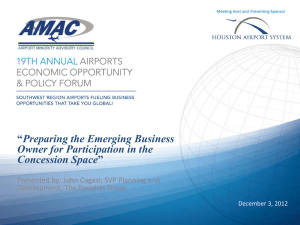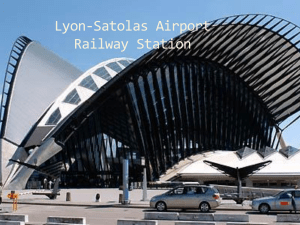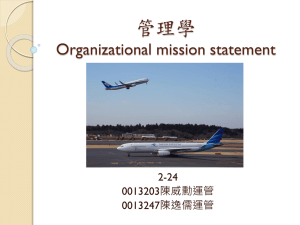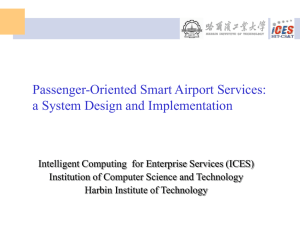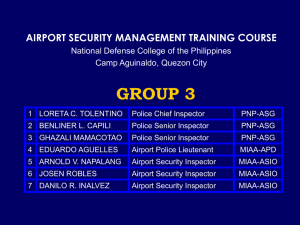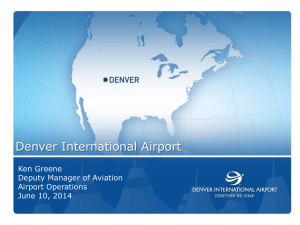Airport Shuttle Agreements - Airport Ground Transportation
advertisement
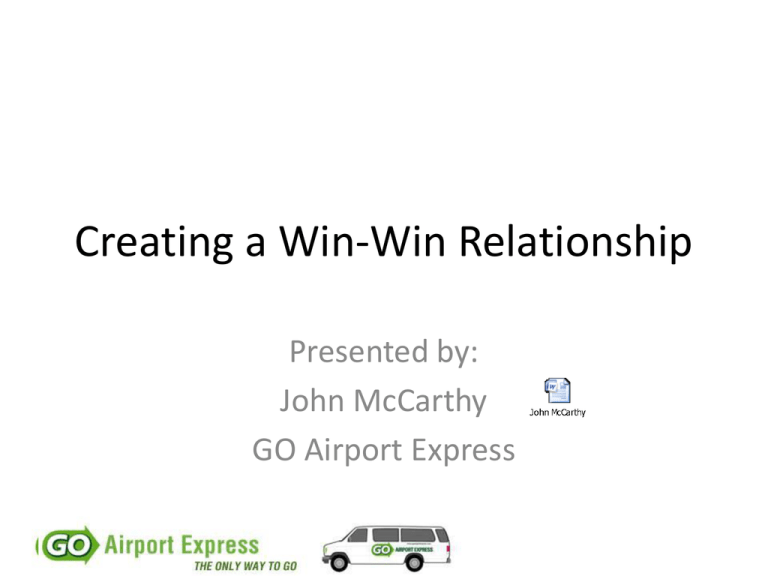
Creating a Win-Win Relationship Presented by: John McCarthy GO Airport Express THE BEST SERVICE IS ACHIEVED WHEN BOTH THE AIRPORT AND THE OPERATOR ARE SUCCESSFUL IN ACHIEVING THEIR GOALS Common Goals • Offer Quality Service to the customer. – Achieve Satisfied Customers and Repeat Business. • Provide Quality Employment for Local Residents Airport Goals • Achieve efficient use of the airport resources i.e curb and terminal space. • Maximize Airport Revenue Operator Goals • Maximize Return on Investment What are we looking for in quality service? • • • • • Professional Driver Attractive, Clean, Late Model Vehicles Frequent Service Easy Access to Service Economical Pricing Professional Driver • Screening of Applicants – Choose the best. • Training and Retraining – Invest in the driver and maximize driver retention. – Offer an attractive compensation package. Attractive, Clean, Late Model Vehicles • Invest in new vehicles to meet demand • Invest in a preventative maintenance program • Invest in in-vehicle technology – – – – Drivecam Mobile Data Terminals Credit Card Swipes GPS In-Vehicle Technology Frequent Service • Minimize Waiting Time • Manage Load Factor Economics. Easy access to Service • Invest in state of the art reservation system. – Offer online reservations through attractive website. – Offer portals and links to travel sites. Brand Service for National Recognition Maintain Efficient and Responsive Call Center Have Professional Staff at Airport Ticket Counters Have Professional Staff at Airport Curbs Economical Fare • Price Service to be 50% to 70% of Cab Fare • Maintain Economical Load Factor LOOKING AT THE ECONOMICS OF THE OPERATION Transportation Industry • Large Capital Investment • Low Profit Margin • Steady Cash Flow Airport Ground Transportation • Business models vary based on specific market conditions. • Profit margins of a healthy company range from 5% to 8%. • When services were regulated, Utility Commissions looked for margins of 5% to 10%. The economics of operating one van. MICRO ANALYSIS OF INDUSTRY Revenue • $120,000 per year; $2,400 per week; $400 per scheduled day. • Vehicle works 25 days per month (six days per week) • Carries 3.5 passengers per trip – 7 passengers on a round trip – 21 passengers per day • The average fare charged is $19.00 per person (Assume competitive cab fare is $30 to $38) Driver’s Wages (35%) • $42,000 per year – Including: • Taxes • Benefits – Excluding • Gratuities • Equates to a straight time hourly rate of $9.25. Vehicle and Equipment (6%) • • • • Depreciated over 5 years. $34,500 Cost of Van $800 Radio $600 Mobile Data Terminal – GPS – Credit Card Swipe • $600 Drive Cam Fuel (11.5%) • 10 Miles Per Gallon • $4.00 cost per gallon Maintenance (6%) • 45,000 miles traveled per year • 16 cents per mile including maintenance, body repair, cleaning and tires. Additional Expenses • Insurance (4%) – Annual premium including $10,000,000 umbrella • Transaction Expense (4%) – Cost of taking a reservation or selling a ticket is approximately $0.75. Administration (12.5%) • Includes: – Hiring – Training – Dispatching – Accounting – Technology – Facilities – Etc. Airport Fees (6%) • Equates to 10% on all business departing the airport. How Do We Share The Pie Annual Per Van Numbers Based upon $120,000 Revenue Expenses / Profit $7,200.00 $6,000.00 Driver Fuel / Maintenance $15,600.00 Vehicle $42,000.00 License / Insurance Transaction Expenses $8,400.00 Marketing & Sales Admin / Overhead $7,200.00 Airport Fees Profit $5,400.00 $7,200.00 $21,000.00 Annual Per Van Numbers Based upon $120,000 Revenue Expenses and Profit 6% Driver 5% Fuel / Maintenance 35% 13% Vehicle License / Insurance Transaction Expenses 7% Marketing & Sales Admin / Overhead 6% Airport Fees 5% 6% 18% Profit Sharing the Revenue • If one area needs a larger slice of the revenue, then other aspects of the operation get a smaller slice. • Mandates often require a larger cut of the revenue. – Vehicles being required to use alternative fuel. – Drivers having to be paid a prevailing union labor rate. – Increasing Airport Fees. Growing the Revenue • Increasing the size of the revenue pie allows for bigger slices. • Ways to increase revenue: – Increase the Fare – Increase the Passenger Volume – Increase the Passengers per Trip Roles Airports Can Play in Increasing Revenue • Promote the Shared Ride Service – Press Releases about Holiday Travel – Airport Website with link to operators website. – Announcements in terminals promoting shared ride service – Directional Signage to Shared Ride Service – Provide Airport Ticket Counters for the Sale of Shared Ride Services – Loading Zones and Counters in convenient locations Airport Directional Signage Counters and Loading Zones Making the Investment • Short and Long Term Investments – How much does one want to invest in a business that will last only three to five years? – How much does one want to invest in a house if they are only going to live there three to five years? – How many will take a job with a career horizon of only three to five years? Making the Investment • The longer the agreement with the airport- the greater commitment of the operator. – Long term agreements generate larger capital investments. – Today’s environment calls for greater investment in vehicles, technology and personnel. Making the investment • Long term airport and operator partnerships have been successful! Return on Investment (5 Year Contract) Capital Investment Vehicle $ 33,000.00 Related Equipment $ 3,500.00 Working Capital $ 6,000.00 Other Technology $ 1,500.00 Total $ 44,000.00 Annual After Tax Earnings 38% Tax Bracket $ 3,700.00 Average Annual Return on Investment Over 1 Year 8.5% Return on Investment (3 Year Contract) Annual After Tax Profit (38% Tax Bracket) $682 Average Return on Investment Annual Return on Investment 1.69% Conclusion • Airports and operators need to be partners in making a shuttle service successful. • The quality of a service is dependent on the economics of the operation. • Long term commitments generate greater capital investment. Conclusion • Revenue must be sufficient to cover: – The cost of providing quality service. – Airport Fees – Return on Investment

